Raizen Bundle
Who Buys Energy from Raízen?
In the ever-changing energy sector, understanding the customer is key. Raízen Company, a leader in integrated energy, has evolved significantly since its 2011 inception. This shift demands a deep dive into the company's Raizen SWOT Analysis, customer demographics, and target market to maintain its competitive edge.
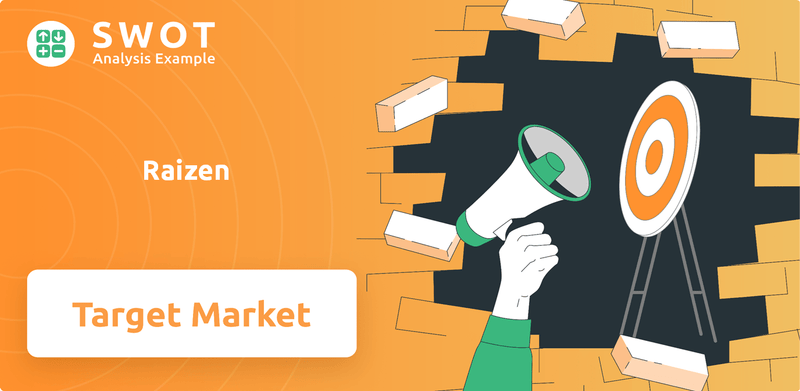
From its roots in sugarcane to its current position, Raízen's target market has expanded to include a broad consumer base. This analysis of Raizen's customer segmentation will uncover who Raizen's target customers are, including their demographics, needs, and location. Understanding the Raizen consumer profile is crucial for strategic planning and adapting to the demands of a market increasingly focused on sustainable energy solutions.
Who Are Raizen’s Main Customers?
Understanding the customer demographics and target market of the Raízen Company is crucial for assessing its business strategy. Raízen operates across both Business-to-Consumer (B2C) and Business-to-Business (B2B) segments, each with distinct characteristics and needs. Analyzing Raízen's customer segmentation provides insights into its market positioning and growth potential.
The company's approach to its target market involves catering to diverse customer groups, from individual consumers to large industrial clients. This dual focus allows Raízen to leverage different market opportunities. The evolution of Raízen's target market reflects broader trends in the energy sector, particularly the shift towards renewable energy sources.
Raízen's customer base is dynamic, adapting to both consumer demands and global sustainability goals. The company's ability to serve these varied segments effectively is a key factor in its financial performance and market success. The following sections will delve deeper into the specifics of Raízen's primary customer segments.
Raízen's B2C segment primarily targets individual consumers through its network of Shell-branded service stations. These customers include daily commuters, long-haul drivers, and individuals seeking convenience retail services. The focus is on providing fuel, convenience, and loyalty programs to attract and retain customers. The company's strategy for this segment is built on brand recognition and customer service.
For its B2B operations, Raízen targets industrial clients, agricultural businesses, and energy providers. Industrial clients include food and beverage manufacturers and chemical companies. Agricultural businesses use Raízen's ethanol as biofuel. Energy providers are served with electricity generated from biomass. This segment focuses on supply reliability, competitive pricing, and tailored energy solutions.
The customer demographics for the B2C segment are broad, encompassing various age groups, income levels, and occupations. The target audience location is primarily in urban and suburban areas. The B2B segment includes large enterprises and utilities. Raízen's customer segmentation strategy involves tailoring offerings to meet the specific needs of each segment.
The primary drivers for B2C customers are convenience, fuel quality, loyalty programs, and competitive pricing. B2B customers are driven by supply reliability, competitive pricing, sustainability credentials, and tailored energy solutions. Raízen's focus on renewable energy solutions and sustainable aviation fuel (SAF) is a key trend. The company's adjusted EBITDA was R$14.3 billion in the 2023-2024 harvest.
Raízen's target market is defined by its dual approach to both B2C and B2B segments. The company's consumer behavior analysis reveals a strong emphasis on convenience and quality for individual customers. For business clients, Raízen prioritizes reliability and sustainable solutions. Marketing Strategy of Raizen highlights the company's approach to reaching its diverse customer base.
- Raízen's ideal customer varies based on the segment, with a focus on individual consumers for fuel and convenience services and large industrial clients for energy solutions.
- The company's customer needs and wants are addressed through tailored offerings, including fuel, sugar, and ethanol.
- Raízen's target market for ethanol and sugar includes industrial clients and agricultural businesses, supporting its revenue and growth.
- The company's customer demographics 2024 reflect a broad range of ages and income levels in the B2C segment, while the B2B segment is focused on large enterprises and utilities.
Raizen SWOT Analysis
- Complete SWOT Breakdown
- Fully Customizable
- Editable in Excel & Word
- Professional Formatting
- Investor-Ready Format
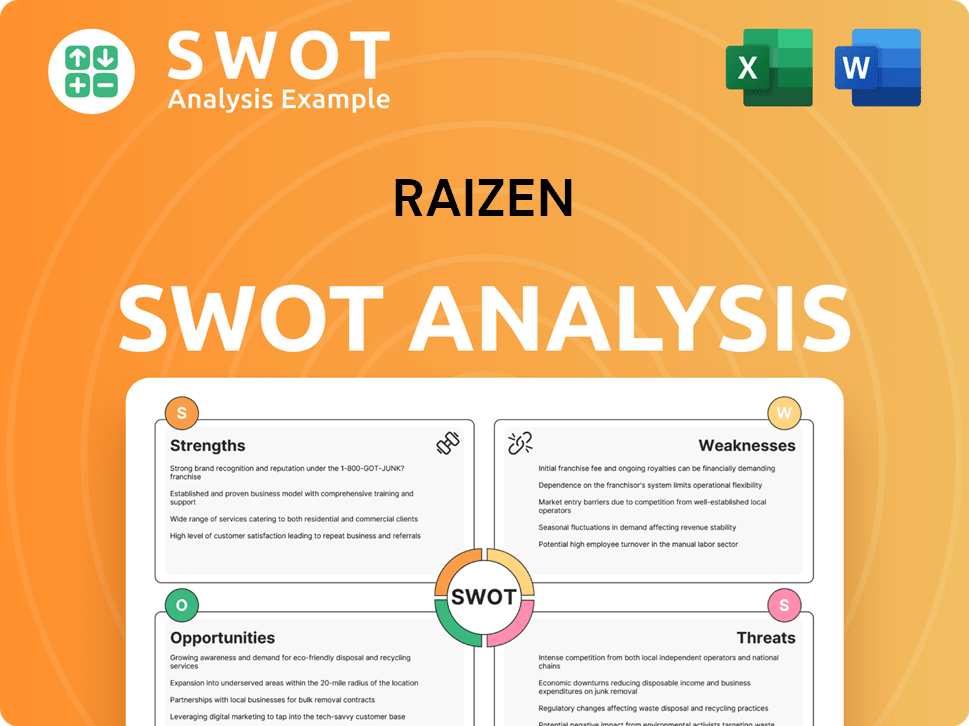
What Do Raizen’s Customers Want?
Understanding the customer needs and preferences is crucial for the success of any business, and Raízen is no exception. The company's diverse customer base, spanning both B2C and B2B segments, requires a nuanced approach to meet their varied demands. This involves tailoring products, services, and marketing strategies to resonate with different customer profiles within the Raizen Company's target market.
For B2C customers, particularly those frequenting Shell service stations, convenience, fuel efficiency, and brand trust are key drivers. B2B clients, on the other hand, prioritize operational efficiency, cost-effectiveness, and sustainability. Raízen addresses these diverse needs by offering a range of products and services, from fuel and convenience items to industrial sugar, ethanol, and renewable energy solutions.
The company's ability to meet these diverse needs is reflected in its financial performance. In the fiscal year 2024, Raízen reported a net revenue of approximately R$ 200.6 billion, demonstrating its strong market position and customer loyalty. This financial success underscores the importance of understanding and catering to the specific needs and preferences of its target market.
B2C customers at Shell service stations prioritize convenience, fuel efficiency, and brand reputation. Loyalty programs like Shell Box and integrated convenience stores enhance the customer experience. The decision-making process is often influenced by location, price competitiveness, and fuel reliability.
B2B customers, including industrial clients and energy consumers, focus on operational efficiency, cost-effectiveness, and sustainability. They seek consistent supply, product quality, and competitive pricing for sugar and ethanol. For energy solutions, reliability, cost management, and renewable energy options are crucial.
Psychological drivers for B2C customers include a seamless refueling experience. Practical drivers involve maintaining vehicle performance and managing fuel costs. B2B motivations center on reducing carbon footprints and meeting sustainability goals through renewable energy.
Raízen addresses energy price volatility and the need for reliable, green energy solutions. It offers diversified energy products and long-term supply contracts. Investments in second-generation ethanol (E2G) meet the growing demand for sustainable biofuels.
Marketing emphasizes the environmental benefits of biofuels for industrial clients. Personalized loyalty programs are offered to B2C consumers. Raízen's approach is to tailor its offerings to align with the specific needs of each customer segment.
For B2C customers, key drivers include convenience, fuel efficiency, and the quality assurance associated with the Shell brand. Loyalty programs and convenience stores cater to the desire for integrated services and rewards. Decision-making criteria often revolve around location, price competitiveness, and the perceived reliability of the fuel.
Raízen employs a customer segmentation strategy that distinguishes between B2C and B2B clients. This allows the company to tailor its offerings and marketing efforts to meet the specific needs of each segment. The company uses various channels to reach its target audience, including service stations, direct sales, and partnerships.
- B2C Segmentation: Focuses on convenience, quality, and brand loyalty, using loyalty programs and in-store services.
- B2B Segmentation: Concentrates on operational efficiency, cost-effectiveness, and sustainability, offering tailored energy solutions and long-term contracts.
- Geographic Segmentation: Raízen operates primarily in Brazil and Argentina, tailoring its products and services to the specific needs of these markets.
- Product-Based Segmentation: Segmenting customers based on their need for fuel, sugar, ethanol, or renewable energy solutions.
Raizen PESTLE Analysis
- Covers All 6 PESTLE Categories
- No Research Needed – Save Hours of Work
- Built by Experts, Trusted by Consultants
- Instant Download, Ready to Use
- 100% Editable, Fully Customizable
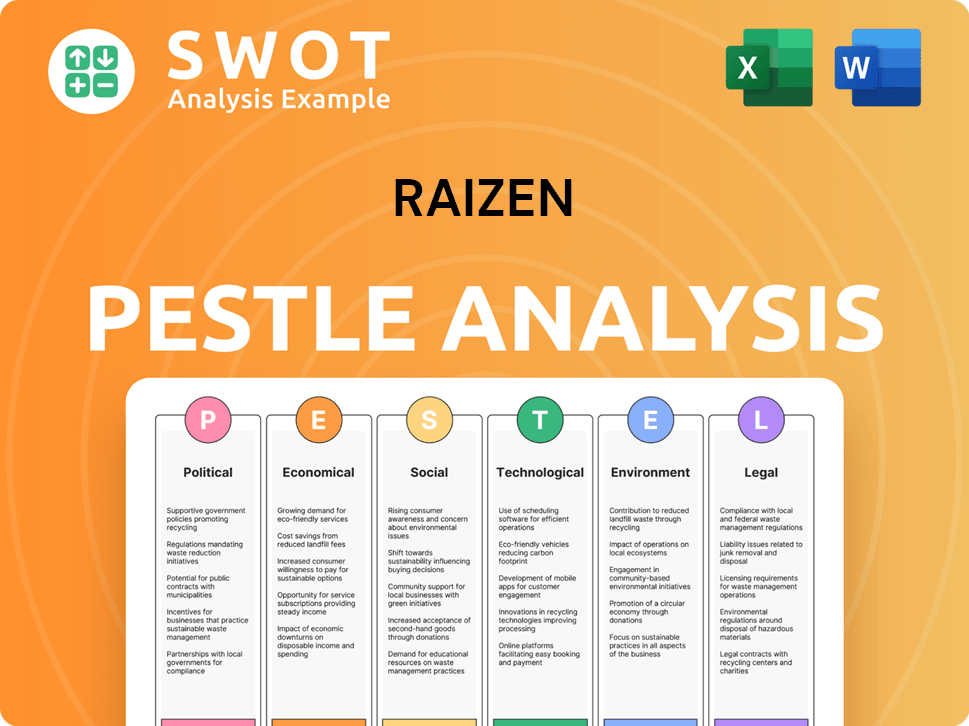
Where does Raizen operate?
The geographical market presence of the company primarily centers on Brazil and Argentina. This strategic focus allows the company to leverage its extensive infrastructure and brand recognition, particularly through its network of Shell-branded service stations. The company's operations are deeply rooted in these two key South American markets.
In Brazil, the company's footprint is extensive, covering major metropolitan areas and key agricultural regions. This widespread presence supports its integrated operations, from sugar and ethanol production to fuel distribution. The company's significant market share in Brazil reflects its strong position in the fuel distribution sector.
In Argentina, the company maintains a substantial presence in fuel distribution and lubricants, also under the Shell brand. The company's approach involves localizing offerings to cater to regional tastes and economic conditions, ensuring relevance and competitiveness in both countries. The company's customer segmentation strategy adapts to regional variations.
The company operates a vast network of over 8,000 Shell service stations and 1,300 Shell Select convenience stores across Brazil and Argentina as of early 2024. This extensive network supports the company's customer demographics and allows it to cater to a broad spectrum of consumers.
For its B2C customers, convenience and brand trust are key drivers. For B2B operations, the focus aligns with industrial hubs and agricultural centers within Brazil and Argentina. The company's target market Raizen strategy is tailored to both consumer segments.
The company has demonstrated strategic growth, with a reported 14% increase in Adjusted EBITDA in the first nine months of the 2023-2024 harvest compared to the previous year. This indicates strong performance within its established markets. Understanding the company's customer demographics is crucial for maintaining and improving this performance.
- The company's geographical focus is primarily on Brazil and Argentina.
- The company has a large network of Shell-branded service stations and convenience stores.
- The company adapts its offerings to regional tastes and economic conditions.
- The company has shown strong financial performance in recent years.
Raizen Business Model Canvas
- Complete 9-Block Business Model Canvas
- Effortlessly Communicate Your Business Strategy
- Investor-Ready BMC Format
- 100% Editable and Customizable
- Clear and Structured Layout
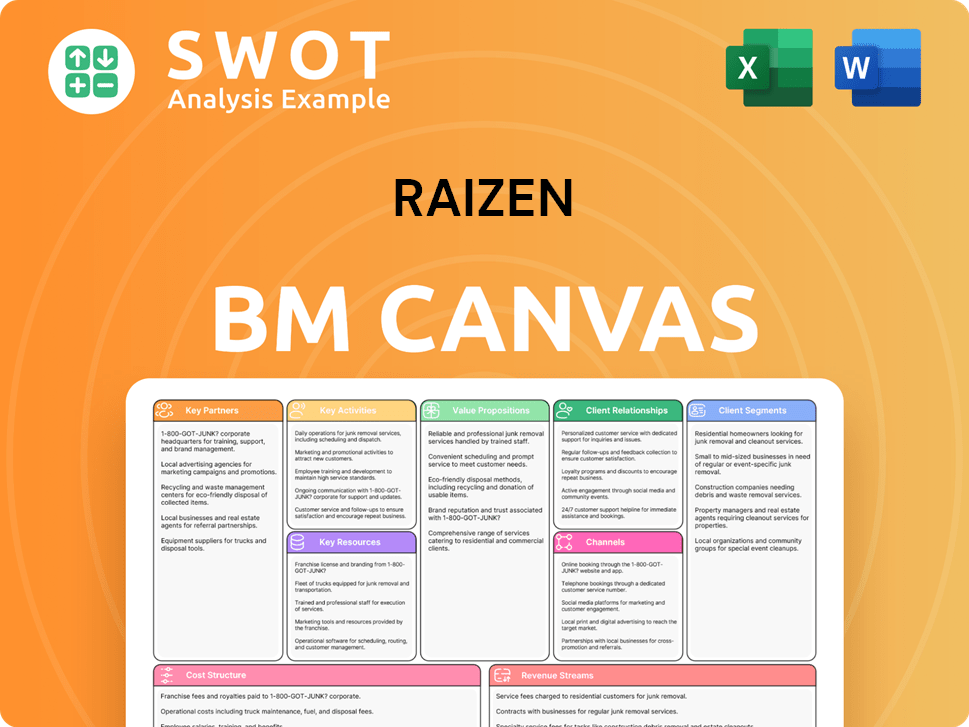
How Does Raizen Win & Keep Customers?
Raízen's customer acquisition and retention strategies are tailored to both business-to-consumer (B2C) and business-to-business (B2B) segments. The company leverages digital and traditional marketing channels, along with robust loyalty programs, to attract and retain customers. This multi-faceted approach is crucial for maintaining a strong market position and driving growth across its diverse operations, including fuel distribution, convenience stores, and renewable energy solutions.
For B2C customers, Raízen focuses on digital platforms like social media and targeted online advertising to promote its Shell-branded fuels and convenience store offerings. Traditional media also plays a role in building brand awareness. The Shell Box app is a key digital tool, offering discounts, loyalty points, and a seamless payment experience, directly enhancing customer convenience and value. This personalization, based on customer data collected through the app, allows for tailored promotions and an improved overall customer experience.
In the B2B segment, Raízen's customer acquisition strategy relies on direct sales forces, strategic partnerships, and a strong emphasis on sustainability, particularly regarding its renewable energy solutions, such as second-generation ethanol. Participation in industry events and conferences is also a key channel. Retention strategies for B2B clients involve long-term contracts, reliable supply chain management, and customized solutions tailored to specific operational needs. Raízen uses CRM systems to manage relationships and segment its B2B clients, enabling targeted communication and service.
Raízen employs digital marketing strategies to reach its B2C customers. Social media campaigns and targeted online advertisements promote Shell-branded fuels and convenience store offerings. The Shell Box app is a key tool for acquisition and retention, offering discounts and loyalty points.
For the B2B segment, Raízen utilizes direct sales forces and strategic partnerships. They also emphasize sustainability, particularly for renewable energy solutions. Industry events and conferences are also key acquisition channels for reaching business clients.
The Shell Box app is a prime example of a digital acquisition and retention tool. It offers discounts, loyalty points, and a seamless payment experience. This personalization, based on customer data, helps tailor promotions and improve the overall customer experience.
Retention strategies for B2B clients include long-term contracts and reliable supply chain management. Raízen offers customized solutions to address specific operational needs. They also use CRM systems for targeted communication and service.
Raízen's strategic investments, such as the 2021 acquisition of Biosev, have strengthened its market position and ability to serve a broader range of B2B customers. The consistent growth in Adjusted EBITDA, reported at R$14.3 billion for the 2023-2024 harvest, reflects the effectiveness of its strategies in maintaining and growing its customer base across both B2C and B2B segments. The company's customer segmentation strategy allows it to tailor offerings to meet the specific needs of different customer groups, which helps in both customer acquisition and retention. Understanding the customer demographics and target market is crucial for Raízen's success in the competitive energy and retail sectors.
Raizen Porter's Five Forces Analysis
- Covers All 5 Competitive Forces in Detail
- Structured for Consultants, Students, and Founders
- 100% Editable in Microsoft Word & Excel
- Instant Digital Download – Use Immediately
- Compatible with Mac & PC – Fully Unlocked
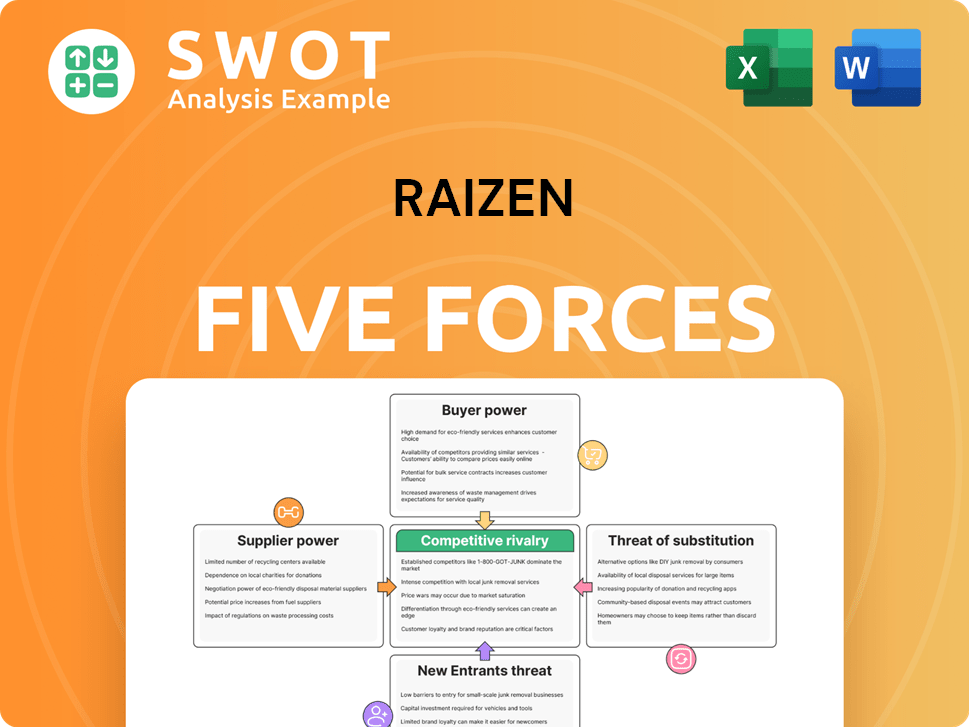
Related Blogs
- What are Mission Vision & Core Values of Raizen Company?
- What is Competitive Landscape of Raizen Company?
- What is Growth Strategy and Future Prospects of Raizen Company?
- How Does Raizen Company Work?
- What is Sales and Marketing Strategy of Raizen Company?
- What is Brief History of Raizen Company?
- Who Owns Raizen Company?
Disclaimer
All information, articles, and product details provided on this website are for general informational and educational purposes only. We do not claim any ownership over, nor do we intend to infringe upon, any trademarks, copyrights, logos, brand names, or other intellectual property mentioned or depicted on this site. Such intellectual property remains the property of its respective owners, and any references here are made solely for identification or informational purposes, without implying any affiliation, endorsement, or partnership.
We make no representations or warranties, express or implied, regarding the accuracy, completeness, or suitability of any content or products presented. Nothing on this website should be construed as legal, tax, investment, financial, medical, or other professional advice. In addition, no part of this site—including articles or product references—constitutes a solicitation, recommendation, endorsement, advertisement, or offer to buy or sell any securities, franchises, or other financial instruments, particularly in jurisdictions where such activity would be unlawful.
All content is of a general nature and may not address the specific circumstances of any individual or entity. It is not a substitute for professional advice or services. Any actions you take based on the information provided here are strictly at your own risk. You accept full responsibility for any decisions or outcomes arising from your use of this website and agree to release us from any liability in connection with your use of, or reliance upon, the content or products found herein.